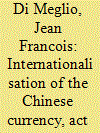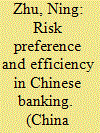|
|
|
Sort Order |
|
|
|
Items / Page
|
|
|
|
|
|
|
| Srl | Item |
| 1 |
ID:
099912


|
|
|
|
|
| Publication |
2010.
|
| Summary/Abstract |
In this paper, we investigate whether the mutual satisfaction of Chinese banks and foreign strategic investors (FSI) in terms of their cooperation with each other affects the performance of Chinese banks. Since 2004, China's banking authority has conducted an annual survey on Chinese banks and their FSI, assessing levels of mutual satisfaction in terms of their cooperation. We use these survey results to examine the effects of satisfaction levels on the profitability of Chinese banks. Our results reveal that satisfaction affects profitability; that is, satisfied foreign investors and Chinese banks yield better performance. Satisfaction determinants for each party are also examined. Although the profitability of Chinese banks does not show a significant effect on the satisfaction of either party, bank loan to deposit ratios, regions of FSI home countries, and the type of Chinese banks are important factors that might affect satisfaction.
|
|
|
|
|
|
|
|
|
|
|
|
|
|
|
|
| 2 |
ID:
088494


|
|
|
|
|
| Publication |
2009.
|
| Summary/Abstract |
This study investigates how foreign bank/investor penetrations influence local bank performance in China. At the country level, foreign bank penetration is proxied by MacroFP, measured by the percentage of banks with foreign strategic investors (FSI) among total banks. At the bank level, foreign bank penetration is proxied by MicroFP, measured by the percentage shareholding of FSI in a bank. When foreign bank penetration is proxied by MacroFP, it is found to improve the profitability of local banks but not to reduce costs. Next, when foreign bank penetration is proxied by MicroFP, it is found to affect neither profitability nor costs. In sum, the present study demonstrates that the opening-up policy is correct from a macro perspective. However, for banks that have introduced FSI, determining the reasons for improvements in performance being inhibited is more important than releasing more shares to foreign investors.
|
|
|
|
|
|
|
|
|
|
|
|
|
|
|
|
| 3 |
ID:
113975


|
|
|
|
|
| Publication |
2012.
|
| Summary/Abstract |
After two waves of important changes in the Chinese system of foreign exchange, one in July 2005, when the Chinese currency was allowed to fluctuate more widely against the US dollar, the other in June 2010, when it was then quoted against an undisclosed basket of currencies, but moreover, was allowed to be partially traded in Hong Kong with the invention of a 'twin', the 'offshore yuan' (CNH), a deep reform could have taken place. The creation of the CNH, allowing debt to be issued internationally in yuan, initially led to the belief that a real set of deep reforms was under way. Yet, like some reforms of the past, which were hesitant or even annulled, the path towards monetary and financial reform is encountering difficulty. The steps taken towards the 'regionalisation' or possibly the 'internationalisation' of the Chinese currency may well be taking the same route. Before the reforms have had time to come to fruition and deliver deep changes, there seems to be some indecisiveness, a sense of relative failure, or at least discovery of the limitations in a process which many, at least at the beginning, believed would be quick and decisive. This article attempts to demonstrate that, like some other Chinese reform processes of the past, the path is not yet very clear and claims of deep changes and unwavering success would be largely premature.
|
|
|
|
|
|
|
|
|
|
|
|
|
|
|
|
| 4 |
ID:
167813


|
|
|
|
|
| Summary/Abstract |
This study uses a dynamic herding model that considers intertemporal and cross‐sectional correlation to confirm that loan herding occurs among joint‐stock commercial banks (JSCBs) and city commercial banks (CCBs). We clarify the motivations for bank loan herding. We find that loan herding by both JSCBs and CCBs results more from following the behavior of other same‐type banks than different‐type banks because of characteristic herding or reputational concerns. Loan herding by JSCBs is motivated by investigative herding, whereas loan herding by CCBs results from informational cascades. Moreover, loan herding has a significantly harmful impact on the operating performance of CCBs but not JSCBs, which may be explained by the irrational behavior of CCBs. Our results will help Chinese bank supervisors develop appropriate policies for handling loan herding.
|
|
|
|
|
|
|
|
|
|
|
|
|
|
|
|
| 5 |
ID:
137537


|
|
|
|
|
| Summary/Abstract |
From the perspective of officials-and-directors (OADs), who are commonly appointed by the Chinese government to the banks it owns, this paper takes studies of government ownership and banks' behavior to the micro level of boards. We analyze the relationship between the special political connection of the OADs and banks' prudential behavior, using a sample of China's City Commercial Banks during 2006–2010. We further explore the impact of OADs' characteristics and the role of independent directors and female directors. The results indicate that banks with OADs exhibit lower prudential behavior, and the higher is the administrative rank of the OADs, the larger is the effect. And the older is the OADs, the larger is the effect. More importantly, the government ownership of banks does not have a significant and robust influence on their prudential behavior. Meanwhile, independent directors can significantly weaken the effect of the OADs, while female directors can enhance the prudential behavior of banks in the absence of OADs. Finally, our results persist even after controlling for sample selection bias and alternative variable measures. Our research contributes to the practice of improving bank governance and regulating systematic risk.
|
|
|
|
|
|
|
|
|
|
|
|
|
|
|
|
| 6 |
ID:
163523


|
|
|
|
|
| Summary/Abstract |
This paper aims to measure banking efficiency by considering risk preferences in 49 Chinese commercial banks during the period of 2004–2012. It adopts a method which allows for endogenous classification of three risk preferences, namely the conservative, moderate and aggressive risk modes, by changing direction vectors. Banking efficiency is measured on the basis of optimal risk preference. The findings show that the moderate risk preference is the most appropriate strategy to achieve technical efficiency in the Chinese banking sector. However, the aggressive risk preference involving low risk costs, compulsory credit spreads and scale expansion played a critical role in promoting the development of Chinese banking sector, but its effect decreased rapidly. The findings also imply that the average technical efficiency scores of joint stock commercial banks and city commercial banks were higher than those of state-owned commercial banks under the optimal risk preference, and that the measured efficiency mainly shows a trend of improvement over time.
|
|
|
|
|
|
|
|
|
|
|
|
|
|
|
|
|
|
|
|
|